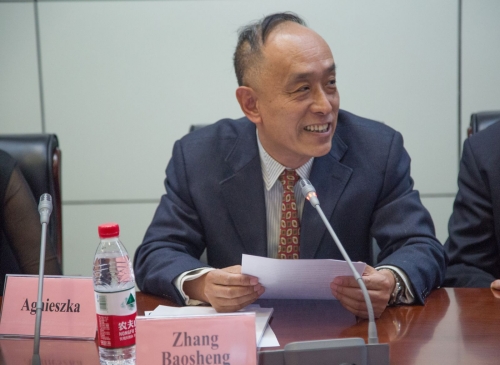
The Seminar on Contemporary Development of International Criminal Justice and its Enlightenment upon China was successfully hosted during March 30 and 31, 2015 at China University of Political Science and Law. Two professors from the Institute of Evidence Law and Forensic Science participated in the seminar. Professor Baosheng Zhang, vice-president of CUPL and, and Dr. Wang Zhuhao, assistant professor of Institute of Evidence and Forensic Science, attended the opening ceremony of this seminar and shared points of view in detail with both domestic and foreign experts. Sir David Baragwanath, appeals chamber judge and former president of STL, H.E. Judge Howard Morrison of ICC, H.E. Judge Liu Daqun, H.E. Judge Agnieszka Klonoweicka-Milart of ECCC and professor Elies Van Sliedregt, Dean of Law Faculty of VU University of Amsterdam, among other distinguished international speakers, attended this seminar. The Center also invited a variety of experts from prestigious Chinese law schools and research institutes.
The conference was tightly focused on the current development of theory and main legal issues before the International Criminal Court (ICC), the International Criminal Tribunal for the former Yugoslavia (ICTY), the International Criminal Tribunal for Rwanda (ICTR) and the Special Tribunal of Lebanon (STL), which included broad and deep discussions. Four main topics in international criminal justice were covered, namely: (1) procedural and evidentiary issues; (2) types of liabilities; (3) sentencing issues; and (4) international criminal justice and China.
Dr. Wang Zhuhao delivered a presentation on observation of China evidence legislation movement, focusing on interactions between supranational legal values and local factors. In addition, Ms. Dai Yue, a LLM student under the tutorial of Professor Baosheng Zhang, made a presentation on comparative study of hearsay evidence jurisprudence in intentional tribunals and China.
The seminar closed on the afternoon of March 31, when foreign and domestic experts expressed a strong expectation that more measures should be taken in the near future by CUPL for the purpose of advancing research in international criminal justice. A compilation of articles submitted by the participants is scheduled to be published in English in the second half of this year.
The Collaborative Innovation Center for Judicial Civilization, CUPL, will regard this seminar as a cornerstone, and dedicate itself to promoting the level of judicial civilization in China, enhancing international academic dialogue, and creating more and more Chinese voices in the arena of international criminal justice.
